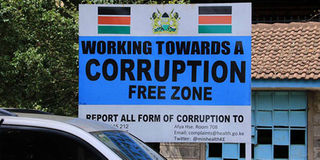Multi-sectoral initiative to boost graft war

A notice outside the Ministry of Health's headquarters in Nairobi warns against corruption. The war against the vice should involve everyone. PHOTO | FILE | NATION MEDIA GROUP
What you need to know:
- In virtually all corruption cases before the courts, businesses and government appear together in the dock like Siamese twins and partners in crime.
- Civil society and religious institutions are expected to create public awareness of corruption and its effects on development.
The recent appointment of Mr Twalib Mbarak as the new Executive Director at the Ethics and Anti-Corruption Commission could not have come at a better time.
Ever since President Uhuru Kenyatta made it clear that he was no longer going to sit back and watch as public funds and resources were stolen and plundered through corruption, the war against the vice has gained momentum.
But this war has largely been driven by the State. Outstanding in the onslaught have been the Office of the President, the Directorate of Criminal Investigations and the Director of Public Prosecutions.
During his first term, President Kenyatta worked with the heads of institutions appointed by the government that preceded his.
REVAMP
A number of them were constitutional office holders with clear tenures of office, and the President must have bid his time as he figured out how he could stamp his authority in his second term for a lasting legacy.
And when he finally acted, it came with a bang. At the ODPP, where Keriako Tobiko had, time and again, openly expressed his frustrations with the then-DCI Ndegwa Muhoro and voiced concerns about shoddy investigations by the Ethics and Anti-Corruption Commission, the President appointed Mr Noordin Haji to head the ODPP and George Kinoti the DCI with the same stroke of the pen.
Mr Tobiko was appointed the Cabinet Secretary for Environment and Forestry, where he has done a commendable job of reclaiming Mau Forest, the Aberdares and other water towers from grabbers and squatters.
COLLABORATION
What has been lacking in the fight against corruption though is the multi-dimensional approach that brings on board other stakeholders.
In a country where corruption has become endemic, affecting almost every facet of the nation’s life, approaches that draw in other stakeholders and the rest of the society stand a better chance of success against sleaze.
And that is precisely where an initiative by the Kenya Private Sector Alliance (Kepsa), civil society, the religious community and the media comes in.
The Multi-Sectoral Initiative against Corruption is putting final touches to a national conference this month.
The meeting, it is hoped, will put in place measures to foster a culture of business integrity and compliance that frowns upon corruption by the sector.
In virtually all corruption cases before the courts, businesses and government appear together in the dock like Siamese twins and partners in crime.
AWARENESS
Partnership with the State and its anti-corruption agencies is, therefore, crucial.
Engaging in advocacy initiatives that aim at repositioning the image of the private sector as a progressive partner in the fight against corruption and not an accomplice in the vice will go a long way in rooting out graft.
Civil society and religious institutions, as custodians of the morals of the society and vanguards in the promotion of the national values and principles of governance, are expected to create public awareness of corruption and its effects on development, human rights and governance.
Mr Churchill is the presiding convener of the Civil Society Reference Group. [email protected]





